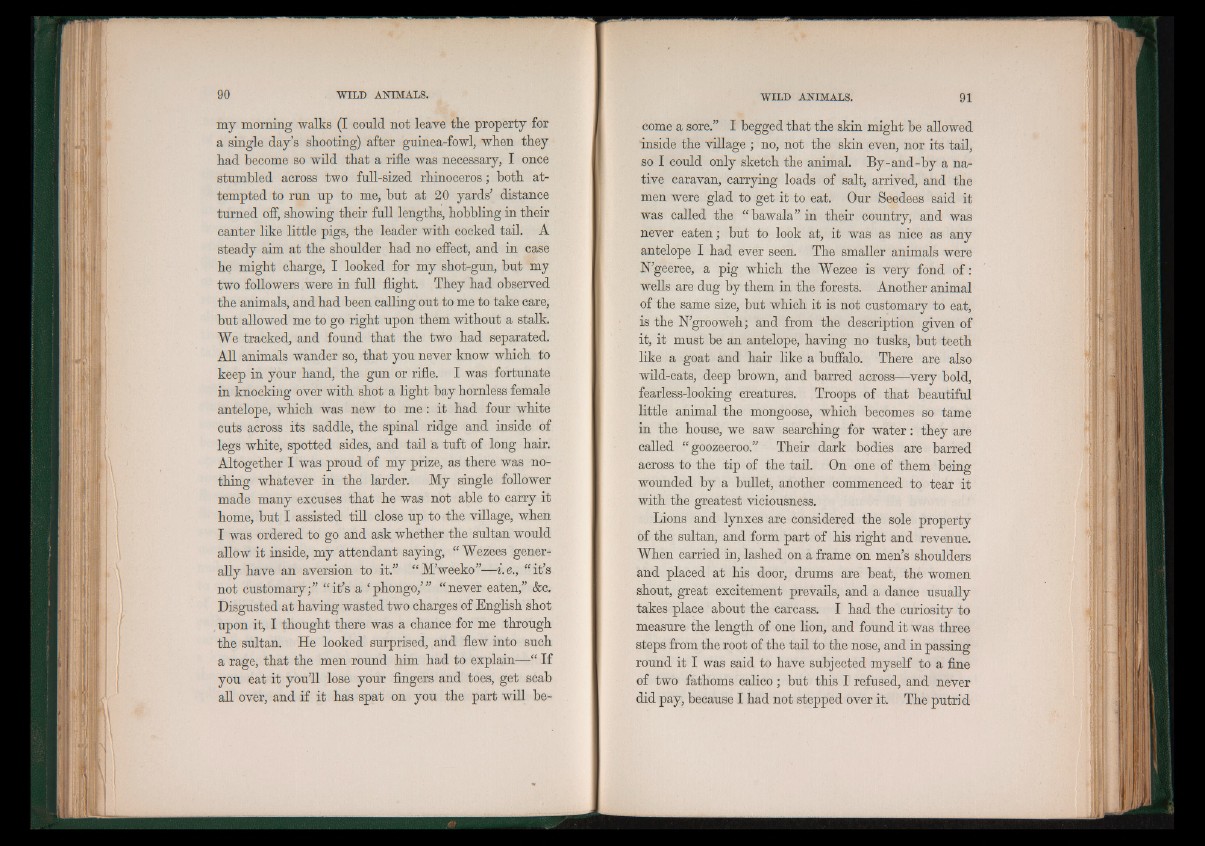
my morning walks (I could not leave the property for
a single day’s shooting) after guinea-fowl, when they
had become so wild that a rifle was necessary, I once
stumbled across two full-sized rhinoceros; both attempted
to run up to me, but at 20 yards’ distance
turned off, showing their full lengths, hobbling in their
canter like little pigs, the leader with cocked tail. A
steady aim at the shoulder had no effect, and in case
he might charge, I looked for my shot-gun, but my
two followers were in full flight. They had observed
the animals, and had been calling out to me to take care,
but allowed me to go right upon them without a stalk.
We tracked, and found that the two had separated.
All animals wander so, that you never know which to
keep in your hand, the gun or rifle. I was fortunate
in knocking over with shot a light bay hornless female
antelope, which was new to m e: it had four white
cuts across its saddle, the spinal ridge and inside of
legs white, spotted sides, and tail a tuft of long hair.
Altogether I was proud of my prize, as there was nothing
whatever in the larder. My single follower
made many excuses that he was not able to carry it
home, but I assisted till close up to the village, when
I was ordered to go and ask whether the sultan would
allow it inside, my attendant saying, “ Wezees generally
have an aversion to it.” “ M’weeko”—i.e., “ it’s
not customary;” “ it’s a fphongo,’” “ never eaten,” &c.
Disgusted at having wasted two charges of English shot
upon it, I thought there was a chance for me through
the sultan. He looked surprised, and flew into such
a rage, that the men round him had to explain—“ If
you eat it you’ll lose your fingers and toes, get scab
all over, and if it has spat on you the part will become
a sore.” I begged that the skin might be allowed
inside the village ; no, not the skin even, nor its tail,
so I could only sketch the animal. By-and-by a native
caravan, carrying loads of salt, arrived, and the
men were glad to get it to eat. Our Seedees said it
was called the “ bawala” in their country, and was
never eaten; but to look at, it was as nice as any
antelope I had ever seen. The smaller animals were
N’geeree, a pig which the Wezee is very fond o f :
wells are dug by them in the forests. Another animal
of the same size, but which it is not customary to eat,
is the N’grooweh; and from the description given of
it, it must be an antelope, having no tusks, but teeth
like a goat and hair like a buffalo. There are also
wild-cats, deep brown, and barred across—very bold,
fearless-looking creatures. Troops of that beautiful
little animal the mongoose, which becomes so tame
in the house, we saw searching for water: they are
called “ goozeeroo.” Their dark bodies are barred
across to the tip of the tail. On one of them being
wounded by a bullet, another commenced to tear it
with the greatest viciousness.
Lions and lynxes are considered the sole property
of the sultan, and form part of his right and revenue.
When carried in, lashed on a frame on men’s shoulders
and placed at his door, drums are beat, the women
shout, great excitement prevails, and a dance usually
takes place about the carcass. I had the curiosity to
measure the length of one lion, and found it was three
steps from the root of the tail to the nose, and in passing
round it I was said to have subjected myself to a fins
of two fathoms calico; but this I refused, and never
did pay, because I had not stepped over it. The putrid